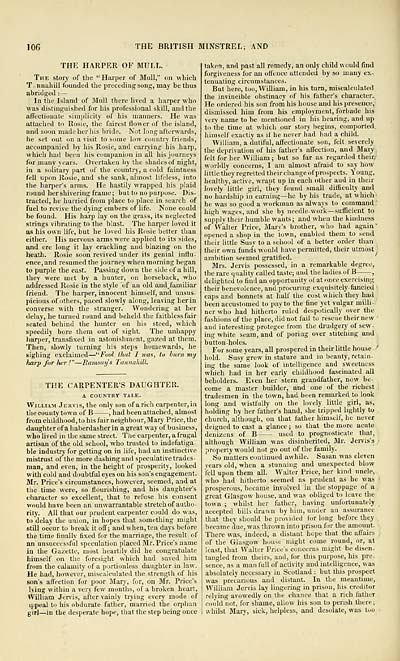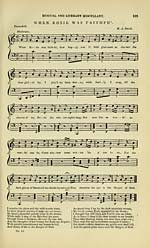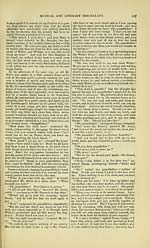Glen Collection of printed music > Printed music > British minstrel, and musical and literary miscellany
(114) Page 106
Download files
Complete book:
Individual page:
Thumbnail gallery: Grid view | List view

106
THE BRITISH MINSTREL; AND
THE HARPER OF MULL.
The story of tbe " Harper of Blull," on whicli
T.nnaliill founded the preceding song, may be thus
abridged : —
In the Island of Mull there lived a harper who
was distinguished for his professional skill, and the
aflectionate simplicity of his manners. He was
attached to Rosie, the fairest iloner of the island,
and soon made her his bride. Not long afterwards,
he set out on a visit to some low-country friends,
accompanied by his Rosie, and carrying his harp,
which liad been his companion in all his journeys
i'or many years. Overtaken by the shades of night,
in a solitary part of the country, a cold faintness
fell upon Rosie, and she sank, almost lifeless, into
the harper's arms. He hastily wrapped his plaid
round her shivering frame; but to no purpose. Dis-
tracted, he hurried from place to place in search of
fuel to revive the dying embers of life. None could
be found. His harp lay on the grass, its neglected
strings vibrating to the blast. The harper loved it
as his own life, but he loved his Rosie better than
cither. His nervous arms were applied to its sides,
and ere long it lay crackling and blazing on the
heath. Rosie soon revived under its genial influ-
ence, and resumed the journey when morning began
to purple the cast. Passing down the side of a hill,
they were met by a hunter, on horseback, who
addressed Rosie in the style of an old and^familiar
friend. The harper, innocent himself, and unsus-
picious of others, paced slowly along, leaving her in
converse with the stranger. Wondering at her
delay, he turned round and beheld the faithless fair
seated behind the hunter on his steed, which
speedily bore them out of sight The unhappy
harper, transfixed in astonishment, gazed at them.
Then, slowly turning his steps homewards, he
sighing exclaimed — "Fvol that I was, to burn my
harp for lur .'" — Ramsay's TaiinahilU
THE CARPENTER'S DAUGHTER.
A COUNTRY TALE.
William Jervis, the only son of arich carpenter,in
the county town of B , had been attached, almost
from childhood, to his fair neighbour, Mary Price, the
daughter of a haberdasher in a great way of business,
who lived in the same street. The carpenter, a frugal
artisan of the old school, who trusted to indefatiga-
ble industry for getting on in life, had an instinctive
mistrust of the more dashing and speculative trades-
man, and even, in the height of prosperity, looked
with cold and doubtful eyes on his son's engagement.
Mr. Price's circumstances, however, seemed, and at
the time were, so flourishing, and his daughter's
character so excellent, that to refuse his consent
would have been an unwarrantable stretch of autho-
rity. All that our prudent carpenter could do was,
to delay the union, in hopes that something might
still occur to break it ofl'; and when, ten days before
the time finally fixed for the marriage, the result of
an unsuccessful speculation placed Mr. Price's name
in the Gazette, most heartily did he congratulate
himself on the foresight which had saved him
from the calamity of a portionless daughter-in law.
He had, however, miscalculated the strength of his
son's affection for poor Mary, for, on Mr. Price's
lying within a very few months, of a broken heart,
William Jervis, after vainly trying every mode of
ippeal to his obdurate father, married the orphan
girl — in the desperate hope, that the step being once
taken, and past all remedy, an only child would find
forgiveness for an oflence attended by so many ex-
tenuating circumstances.
But here, too, William, in his turn, miscalculated
the invincible obstinacy of his father's character.
He ordered his son from his house and his presence,
dismissed him from his employment, forbade his
vei-y name to be mentioned in his hearing, and up
to the time at which our story begins, comported,
himself exactly as if he never had had a child.
William, a dutiful, affectionate son, felt severely
the deprivation of his father's affection, and Mary,
felt for her William; but so far as regarded their;
worldly concerns, I am almost afraid to say how
little they regretted their change of prospects. Young,
healthy, active, wrapt up in each otlier and in their
lovely little girl, they found small difficulty and
no hardship in eai'ning— he by his trade, at which
he was so good a workman as always to command '
high wages, and she by needle-work — sufficient to
supply their humble wants ; and when the kindness
of Walter Price, Mary's brother, who had again '
opened a shop in the town, enabled them to send
their little Susy to a school of a better order than
their own funds would have permitted, their utmost^
ambition seemed gratified.
Mrs. Jervis possessed, in a remarkable degree,
the rare quality called taste; and the ladies of B ,
delighted to find an oi)portunity of at once exercising
their benevolence, and procuring exquisitely-fancied •
caps and bonnets at half the cost which they had
been accustomed to pay to the fine yet vulgar milli-
ner who had hitherto ruled despotically over the
fashions of the place, did not fail to rescue their new '
and interesting protegee from the drudgery of sew-
ing white seam, and of poring over stitching and
button-holes.
For some years, all prospered in their little house-'
hold. Susy grew in stature and in beauty, retain-
ing the same look of intelligence and sweetness
which had in her early childhood fascinated all
beholders. Even her stern grandfather, now be-
come a master builder, and one of the richest ,
tradesmen in the town, had been remarked to look
long and wistfully on the lovely little girl, as,
holding by her father's hand, she tripped lightly to
church, although, on that father himself, he never
deigned to cast a glance ; so that the more acute
denizens of B used to prognosticate that,
although William was disinherited, Mr. Jervis's •
property would not go out of the family.
So matters continued awhile. Susan was eleven
years old, when a stunning and unexpected blow
feU upon them all. Walter Price, her kind uncle,
who had hitherto seemed as prudent as he was ■
prosperous, became involved in the stoppage of a
great Glasgow house, and was obliged to leave the
town ; whilst her father, having unfortunately
accepted bills drawn by him, under an assurance
that they should be provided for long before they
became due, was thrown into prison for the amount.
There was, indeed, a distant hope that the afl'airs ,
of the Glasgow house might come round, or, at
least, that Walter Price's concerns might be disen-
tangled from theirs, and, for this purpose, his pre-
sence, as a man full of activity and intelligence, was
absolutely necessary in Scotland : but this prospect
was precarious and distant. In the meantime,
William Jervis lay lingering in prison, his creditor
relying avowedly on the chance that a rich father
could not, for shame, allow his son to perish there;
w hilst Mary, sick, helpless, and desolate, was too
THE BRITISH MINSTREL; AND
THE HARPER OF MULL.
The story of tbe " Harper of Blull," on whicli
T.nnaliill founded the preceding song, may be thus
abridged : —
In the Island of Mull there lived a harper who
was distinguished for his professional skill, and the
aflectionate simplicity of his manners. He was
attached to Rosie, the fairest iloner of the island,
and soon made her his bride. Not long afterwards,
he set out on a visit to some low-country friends,
accompanied by his Rosie, and carrying his harp,
which liad been his companion in all his journeys
i'or many years. Overtaken by the shades of night,
in a solitary part of the country, a cold faintness
fell upon Rosie, and she sank, almost lifeless, into
the harper's arms. He hastily wrapped his plaid
round her shivering frame; but to no purpose. Dis-
tracted, he hurried from place to place in search of
fuel to revive the dying embers of life. None could
be found. His harp lay on the grass, its neglected
strings vibrating to the blast. The harper loved it
as his own life, but he loved his Rosie better than
cither. His nervous arms were applied to its sides,
and ere long it lay crackling and blazing on the
heath. Rosie soon revived under its genial influ-
ence, and resumed the journey when morning began
to purple the cast. Passing down the side of a hill,
they were met by a hunter, on horseback, who
addressed Rosie in the style of an old and^familiar
friend. The harper, innocent himself, and unsus-
picious of others, paced slowly along, leaving her in
converse with the stranger. Wondering at her
delay, he turned round and beheld the faithless fair
seated behind the hunter on his steed, which
speedily bore them out of sight The unhappy
harper, transfixed in astonishment, gazed at them.
Then, slowly turning his steps homewards, he
sighing exclaimed — "Fvol that I was, to burn my
harp for lur .'" — Ramsay's TaiinahilU
THE CARPENTER'S DAUGHTER.
A COUNTRY TALE.
William Jervis, the only son of arich carpenter,in
the county town of B , had been attached, almost
from childhood, to his fair neighbour, Mary Price, the
daughter of a haberdasher in a great way of business,
who lived in the same street. The carpenter, a frugal
artisan of the old school, who trusted to indefatiga-
ble industry for getting on in life, had an instinctive
mistrust of the more dashing and speculative trades-
man, and even, in the height of prosperity, looked
with cold and doubtful eyes on his son's engagement.
Mr. Price's circumstances, however, seemed, and at
the time were, so flourishing, and his daughter's
character so excellent, that to refuse his consent
would have been an unwarrantable stretch of autho-
rity. All that our prudent carpenter could do was,
to delay the union, in hopes that something might
still occur to break it ofl'; and when, ten days before
the time finally fixed for the marriage, the result of
an unsuccessful speculation placed Mr. Price's name
in the Gazette, most heartily did he congratulate
himself on the foresight which had saved him
from the calamity of a portionless daughter-in law.
He had, however, miscalculated the strength of his
son's affection for poor Mary, for, on Mr. Price's
lying within a very few months, of a broken heart,
William Jervis, after vainly trying every mode of
ippeal to his obdurate father, married the orphan
girl — in the desperate hope, that the step being once
taken, and past all remedy, an only child would find
forgiveness for an oflence attended by so many ex-
tenuating circumstances.
But here, too, William, in his turn, miscalculated
the invincible obstinacy of his father's character.
He ordered his son from his house and his presence,
dismissed him from his employment, forbade his
vei-y name to be mentioned in his hearing, and up
to the time at which our story begins, comported,
himself exactly as if he never had had a child.
William, a dutiful, affectionate son, felt severely
the deprivation of his father's affection, and Mary,
felt for her William; but so far as regarded their;
worldly concerns, I am almost afraid to say how
little they regretted their change of prospects. Young,
healthy, active, wrapt up in each otlier and in their
lovely little girl, they found small difficulty and
no hardship in eai'ning— he by his trade, at which
he was so good a workman as always to command '
high wages, and she by needle-work — sufficient to
supply their humble wants ; and when the kindness
of Walter Price, Mary's brother, who had again '
opened a shop in the town, enabled them to send
their little Susy to a school of a better order than
their own funds would have permitted, their utmost^
ambition seemed gratified.
Mrs. Jervis possessed, in a remarkable degree,
the rare quality called taste; and the ladies of B ,
delighted to find an oi)portunity of at once exercising
their benevolence, and procuring exquisitely-fancied •
caps and bonnets at half the cost which they had
been accustomed to pay to the fine yet vulgar milli-
ner who had hitherto ruled despotically over the
fashions of the place, did not fail to rescue their new '
and interesting protegee from the drudgery of sew-
ing white seam, and of poring over stitching and
button-holes.
For some years, all prospered in their little house-'
hold. Susy grew in stature and in beauty, retain-
ing the same look of intelligence and sweetness
which had in her early childhood fascinated all
beholders. Even her stern grandfather, now be-
come a master builder, and one of the richest ,
tradesmen in the town, had been remarked to look
long and wistfully on the lovely little girl, as,
holding by her father's hand, she tripped lightly to
church, although, on that father himself, he never
deigned to cast a glance ; so that the more acute
denizens of B used to prognosticate that,
although William was disinherited, Mr. Jervis's •
property would not go out of the family.
So matters continued awhile. Susan was eleven
years old, when a stunning and unexpected blow
feU upon them all. Walter Price, her kind uncle,
who had hitherto seemed as prudent as he was ■
prosperous, became involved in the stoppage of a
great Glasgow house, and was obliged to leave the
town ; whilst her father, having unfortunately
accepted bills drawn by him, under an assurance
that they should be provided for long before they
became due, was thrown into prison for the amount.
There was, indeed, a distant hope that the afl'airs ,
of the Glasgow house might come round, or, at
least, that Walter Price's concerns might be disen-
tangled from theirs, and, for this purpose, his pre-
sence, as a man full of activity and intelligence, was
absolutely necessary in Scotland : but this prospect
was precarious and distant. In the meantime,
William Jervis lay lingering in prison, his creditor
relying avowedly on the chance that a rich father
could not, for shame, allow his son to perish there;
w hilst Mary, sick, helpless, and desolate, was too
Set display mode to: Large image | Transcription
Images and transcriptions on this page, including medium image downloads, may be used under the Creative Commons Attribution 4.0 International Licence unless otherwise stated. ![]()
| Special collections of printed music > Glen Collection of printed music > Printed music > British minstrel, and musical and literary miscellany > (114) Page 106 |
|---|
| Permanent URL | https://digital.nls.uk/91436313 |
|---|
| Description | Scottish songs and music of the 18th and early 19th centuries, including music for the Highland bagpipe. These are selected items from the collection of John Glen (1833 to 1904). Also includes a few manuscripts, some treatises, and other books on the subject. |
|---|
| Description | The Glen Collection and the Inglis Collection represent mainly 18th and 19th century Scottish music, including Scottish songs. The collections of Berlioz and Verdi collected by bibliographer Cecil Hopkinson contain contemporary and later editions of the works of the two composers Berlioz and Verdi. |
|---|

